

#8UnlikeUs - Hui_Halpin_Collective-Individuation.pdf. Microsoft Word - GCM.doc - 15Movements.pdf. Microsoft Word - TXT_131024_ECC Report_V100_HL.docx - ecc_report_final.pdf. Towards a new style of political organization for commons-oriented mobilizations ? Image by Olmo Calvo Madrilonia/@PinkNoiseRev Translated by Stacco Troncoso, edited by Jane Loes Lipton -Guerrilla Translation!

Original text in Spanish The 15-M movement seems to be at an impasse, unsure of how to make use of its multiple victories and enormous public support. To break out of this situation, numerous organizations, assemblies and collectives are repeatedly appealing to the ideal of unity (amongst the political left, the movement, the “bottom 99”) as a means of reaching the necessary levels of coordination needed for standing up to, and defeating, the government and markets.
The fact is that since the birth of 15M, we’ve spent more than two years experimenting with radically new modes of mass organization. The reductionist focus: unity as convergence. In our opinion, most attempts to coordinate unity amongst “the movement” (or “the left”, or “pick-your-favourite-social-subject”) stem from a terribly reductionist mindset: unity as convergence.
Graph 1. 1. 2. 3. 4. Side event: Commons Culture Communication. Gathering clarity on the multi-facetted concept of the commons and commoning in our modern world may seem quite a task.
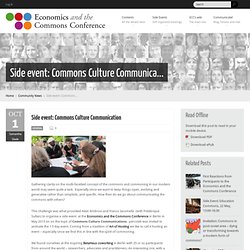
Especially since we want to keep things open, evolving and generative rather than simplistic, and specific. How then do we go about communicating the commons with others? This challenge was what provoked Alain Ambrosi and Franco Iacomella (with Frédérique Sultan) to organise a side event at the Economics and the Commons Conference in Berlin in May 2013 on on the topic of Commons Culture Communications. percolab was invited to animate the 1.5 day event.
Coming from a tradition of Art of Hosting we like to call it hosting an event – especially since we find this in line with the spirit of commoning. We found ourselves at the inspiring BetaHaus coworking in Berlin with 25 or so participants from around the world – researchers, advocates and practitioners. I) Our opening question, “How have you been a commoner lately?” Freerange Vol.7: The Commons. Submissions are open for Freerange Vol.7.
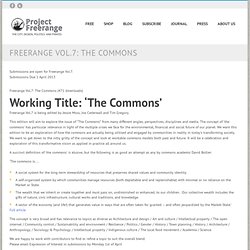
Submissions Due 1 April 2013 Freerange Vol.7: The Commons (471 downloads) Working Title: ‘The Commons’ Freerange Vol.7 is being edited by Jessie Moss, Joe Cederwall and Tim Gregory. This edition will aim to explore the issue of “The Commons” from many different angles, perspectives, disciplines and media. 12 Reasons You'll Be Hearing More About the Commons. The time is ripe for more sharing, collaboration and solidarity (Credit: Photo by Jaxxon under a Creative Commons license from flickr.com) The continuing economic crisis shows the foolishness of promoting selfish individualism as the chief operating principle for our society. 1.
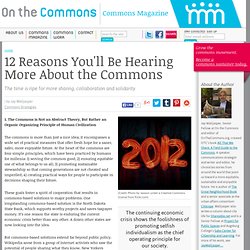
The Commons is Not an Abstract Theory, But Rather an Organic Organizing Principle of Human Civilization The commons is more than just a nice idea; it encompasses a wide set of practical measures that offer fresh hope for a saner, safer, more enjoyable future. These goals foster a spirit of cooperation that results in commons-based solutions to major problems. But commons-based solutions extend far beyond public policy. 2. Les biens communs ou le nouvel espoir politique du XXIe siècle ? Il y a plus de dix ans, Philippe Quéau (qu’on ne lit pas assez) s’exprimait ainsi lors d’une conférence organisée par le Club de Rome (qui a eu raison avant l’heure ?)

Ayant pour titre Du Bien Commun Mondial à l’âge de l’Information : « L’intérêt public est beaucoup plus difficile à définir que l’intérêt privé. C’est un concept plus abstrait. Il intéresse tout le monde, et donc personne en particulier. Plus les problèmes sont abstraits et globaux, plus ils sont difficiles à traiter et à assimiler par le public. The Commons, Short and Sweet. I am always trying to figure out how to explain the idea of the commons to newcomers who find it hard to grasp.
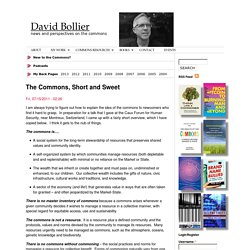
In preparation for a talk that I gave at the Caux Forum for Human Security, near Montreux, Switzerland, I came up with a fairly short overview, which I have copied below. I think it gets to the nub of things. The commons as a common paradigm for social movements and beyond. World Social Forum: 10 years after: Elements of a new agenda The commons as a common paradigm for social movements and beyond (version 1.0) We can only promote the commons as a new narrative for the 21st century if they are identified as a common denominator by different social movements and schools of thought.
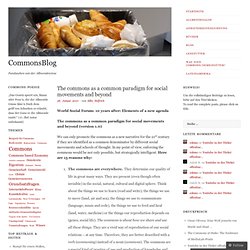
In my point of view, enforcing the commons would be not only possible, but strategically intelligent. Here are 15 reasons why: The Commons as a Transformative Vision. By David Bollier & Silke Helfrich of The Commons Strategy Group, It has become increasingly clear that we are poised between an old world that no longer works and a new one struggling to be born.

Surrounded by an archaic order of centralized hierarchies on the one hand and predatory markets on the other, presided over by a state committed to planet-destroying economic growth, people around the world are searching for alternatives. That is the message of various social conflicts all over the world – of the Spanish Indignados and the Occupy movement, and of countless social innovators on the Internet. People want to emancipate themselves not just from poverty and shrinking opportunities, but from governance systems that do not allow them meaningful voice and responsibility. This book is about how we can find the new paths to navigate this transition.
But since there is no path forward, we must make the path. The Occupy Movement saw citizens rise up in search of answers and alternatives. ECC 2013 Berlin – highlights. The Economics and the Commons Conference in Berlin closed last month.
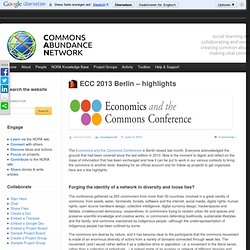
Everyone acknowledged the ground that had been covered since the last edition in 2010. Now is the moment to digest and reflect on the mass of information that has been exchanged and how it can be put to work in our various contexts to bring the commons to another level. Awaiting for an official account and for follow-up projects to get organized, here are a few highlights. Growing the Commons as Meta-narrative? How about 'Growing the Commons' as a meta-narrative for a paradigm shift? Rethinking Sustainable Development in terms of Commons. Wouldn't sustainable development initiatives, mechanisms and policies considerably gain in effectiveness if they were planned and assessed in relation to the principles, processes and practices of the commons?
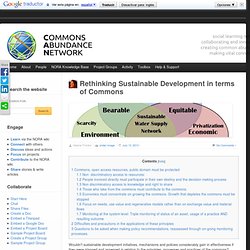
The commons are a social system that intimately associates people or stakeholders with their resources and the participatory and mindful ways they are managing/producing/caring for them. Commons can be described in a variety of ways and along several dimensions. The three below function together as a whole: As object, the commons are the Common Wealth, the assets that we inherit or create, use and change, and that serve our livelihood (our natural, social and cultural resources, genetic and biological diversity, knowledge, etc), that people pass on to future generations.
These assets need to be nurtured, (re)generated and to be indiscriminately accessible to the greatest number. Commons, open access resources, public domain must be protected We are here on relatively new territory. Coalescing Around the Commons. What we strive to hold, share and take care of in common Most of us who are actively seeking to create a world where people and nature can thrive are actually nurturing a piece of the commons. By telling our stories and how they relate to the commons, we can aggregate coherence from our variety of disparate initiatives and accelerate the movement towards new ways of overcoming our current economic, social and environmental crises. We often think of the commons as shared assets, whether elements of our environment such as forests, the atmosphere, oceans, space, rivers, lakes, fisheries or grazing land, or emerging digital and cultural resources such as the internet or Wikipedia. Commons are usually characterized as resources, natural or social, tangible or intangible that must be kept abundant; collaboratively governed by the communities and networks that produce or use them and have a stake in keeping them sustainable for their own livelihood and for posterity.
Federating Efforts. The commons as scaffold and underlying guiding principle. Fédérer les efforts pour un monde meilleur.